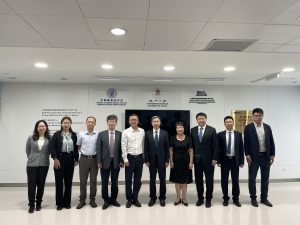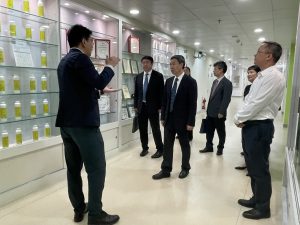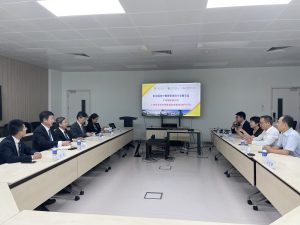On September 24, 2024, a delegation led by Dr. Wang Zhiyong, Deputy Commissioner of the National Administration of Traditional Chinese Medicine (NATCM), visited the Institute of Chinese Medical Sciences (ICMS) at the University of Macau. The delegation was accompanied by Prof. Mo Hui, Director of the World Health Organization Collaborating Centre for Traditional Medicine (Macau). They were warmly received by Prof. Li Peng, Deputy Director of ICMS, Prof. Hu Yuanjia, Dr. Wang Shengpeng, and Dr. Cheang Wai San from ICMS. The delegation conducted an on-site inspection of the ICMS’s Chinese medicine research and development laboratories and the pilot experimental platform for Chinese medicine preparations. They subsequently engaged in in-depth discussions and exchanges with ICMS representatives on promoting Chinese medicine development.
During the discussions, Prof. Li Peng delivered a welcome speech and expressed sincere gratitude to the NATCM for its unwavering support for the development of Chinese medicine in Macau. Prof. Li introduced the overall situation and rapid development of the institute’s traditional Chinese medicine disciplines in recent years, particularly highlighting the notable achievements in the transformation and industrialization of Chinese medicine research outcomes. Prof. Li stated that ICMS has been committed to promoting innovative research in Chinese medicine and maintaining close connections with international partners, striving to introduce Chinese medicine research results to the global market.
In his speech, Dr. Wang Zhiyong fully affirmed the significant achievements made by the University of Macau in the field of traditional Chinese medicine. He pointed out that the National Administration of Traditional Chinese Medicine attaches great importance to the development of traditional Chinese medicine in Macau. In recent years, the administration has successively introduced a number of policies, facilitating the development of Macau’s traditional Chinese medicine industry. These initiatives have not only injected vitality into the development of traditional Chinese medicine in Macau but also brought new opportunities for the moderate diversification of Macau’s overall economy. He encouraged the University of Macau to fully utilize this series of policy benefits to further promote scientific research innovation and the transformation of Chinese medicine achievements.




